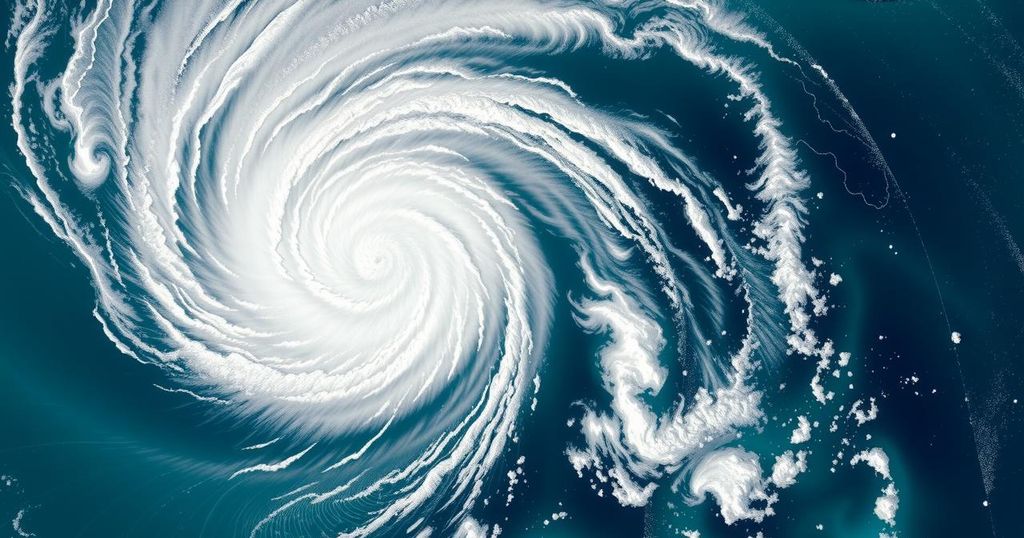World news
AFRICA, AP, BRUNO RETAILLEAU, CAPE TOWN, CHI, COMOROS, EMERGENCY RESPONSE, EUROPE, EUROPEAN UNION, FLOODING, FRANCE, FRANÇOIS - XAVIER BIEUVILLE, FRANÇOIS BAYROU, FRANCOIS BAYROU, FRENCH INTERIOR MINISTRY, FRENCH WEATHER SERVICE, GRENADA, INDIAN OCEAN, INTERIOR MINISTRY, MADAGASCAR, MAYOTTE, MAYOTTE LA 1ERE, MOZAMBIQUE, NATURAL DISASTER, NATURAL DISASTERS, NORTH AMERICA, PARIS, SOUTH AFRICA, UNITED STATES
Marcus Chen
0 Comments
Cyclone Chido Devastates Mayotte, Causing Heavy Casualties and Damage
Cyclone Chido has devastated Mayotte, leading to a death toll estimated at several hundred, potentially nearing 1,000. With winds exceeding 220 kph, it is categorized as a severe cyclone, and local officials report extensive damage to infrastructure. The cyclone’s effects are now being felt in northern Mozambique, with millions at risk as the region endures significant humanitarian challenges.
Cyclone Chido has wreaked havoc across the French territory of Mayotte, leading to a staggering death toll estimated at several hundred, potentially nearing 1,000, according to local government officials. François-Xavier Bieuville, the Prefect of Mayotte, stated that gathering accurate casualty figures is challenging in the aftermath of the cyclone which struck on Saturday, inflicting widespread destruction. The cyclone, now moving towards the east coast of Africa, has registered devastating impacts in northern Mozambique as well.
The intensity of Cyclone Chido, with winds exceeding 220 kilometers per hour (136 mph), classifies it as a category 4 cyclone, the second most severe category on the scale. The cyclone has not only impacted Mayotte but has also affected adjacent regions, including the Comoros and Madagascar. As a result, this cyclone has been acknowledged as the worst to strike Mayotte in nearly 90 years. French Interior Minister Bruno Retailleau expressed concerns about the high casualties, underlining the extensive devastation on the island.
Prime Minister François Bayrou indicated that critical infrastructure, including the primary hospital and the island’s airport, has sustained severe damages, exposing vulnerable populations in slum areas to significant risks. Mayotte, which has a population just surpassing 300,000, faces a critical humanitarian crisis, marked by flattened neighborhoods, uprooted trees, and sunk vessels. In response, the French government has deployed 1,600 police and gendarmerie personnel to facilitate rescue operations and deter potential looting.
In addition to on-ground support from local and French rescuers, military aircraft and ships have been mobilized to deliver emergency supplies. National leaders, including President Emmanuel Macron and Pope Francis, have expressed concern and support for the victims. Chido’s path has continued into Mozambique, where emergency officials warned that approximately 2.5 million individuals may face repercussions in two northern provinces. This yearly cyclone season has seen intensified incidents in recent years, highlighting the risks of flooding and waterborne diseases like cholera and malaria inherent in such disasters.
As global awareness of climate change intensifies, there is growing recognition that cyclones such as Chido are exacerbated by such factors, disproportionately impacting low-income regions. Developing countries, which contribute minimally to global emissions, bear extensive humanitarian burdens and are calling for increased international assistance to combat climate-related adversities.
Cyclone Chido is part of a recurring pattern of intense cyclones that have increasingly adversely affected southeastern Africa. The region experiences a cyclone season annually from December to March, with climate change contributing to the severity of such weather events. Historical cyclones, like Idai and Freddy, have highlighted the ongoing humanitarian crises resulting from these natural disasters. Areas like Mayotte, Mozambique, Malawi, and Zimbabwe have faced persistent damages, exposing vulnerabilities in infrastructure and public health. With the worsening of these crises, calls for immediate international assistance are becoming crucial amid increasing weather-related calamities.
In summary, Cyclone Chido has led to a profound humanitarian crisis in Mayotte, with death toll estimates reaching alarming levels. The destruction of critical infrastructure exacerbates risks for vulnerable populations. As Chido continues its trajectory across the Indian Ocean, the impacts are likely to spread into Mozambique and beyond. The ongoing climate crisis necessitates immediate global attention and support to assist affected regions that suffer immensely from these recurrent natural disasters.
Original Source: www.pbs.org




Post Comment